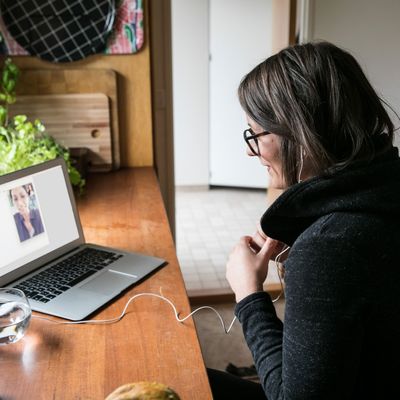
Please note the story you’re reading was published more than a day ago. COVID-19 news and recommendations change fast: Read the latest here to stay up-to-date. We’ve lifted our paywall on all essential news and updates about the coronavirus.
On Monday, I asked my therapist if we could meet over Skype instead of in person. I’d already decided to work from home that day, but we had not yet been encouraged to work from home until April; reports out of Italy were increasingly dire, but Trump had not yet banned travel from Europe, nor had the NBA season been halted. Broadway, as of then, was still open. I was the first of my therapist’s clients to make such a request; I am sure there’ve been others since.
When I wrote her the email I felt sheepish but resolute: I told her that my anxiety (which has often centered around concerns about my health) made it impossible to commute into the city to see her, but I knew that same anxiety meant I needed her help. An all-too-timely academic review of research on the impacts of quarantine on mental health found that a third of subjects studied experienced poor mental health after a period of isolation; feelings of neglect, isolation, anger, and irritability are to be expected.
COVID-19 has exposed a number of fissures in our so-called social safety net, of which mental health care is only one. Many people can’t afford a therapist in the first place. If you were to decide that now is a good time to get one, you might find it even more difficult than usual, as health-care services grow more strained under the threat of infection.
Therapists in New York City, where there’s a quickly growing outbreak, are taking coronavirus into consideration. My co-worker Kerensa told me her therapist sent an email out last weekend, offering clients the option to hold their sessions via teletherapy “so long as New York City continues to be at risk for coronavirus exposure.” And this was before Mayor Bill de Blasio declared the city to be in a state of emergency.
Another co-worker, Allison Davis, said she tried to go to in-person therapy earlier this week, but called her therapist on the way there to let her know she’d been in the same building as someone with a confirmed case. Her therapist told her to stay outside, and asked if they could hold their session over the phone instead.
“I sat on a bench outside of the Milk Bar across the street, and she came to the window and waved,” says Allison. “She said she liked my dress. Then, when the session ended, she came back to the window and gave me another wave, and blew a kiss.”
Gabrielle Korn, director of fashion and culture at Refinery29, has been on voluntary home quarantine since being in Milan for Fashion Week. As a result, she’s attended her therapy appointments over FaceTime, and has mixed feelings about the experience. “It’s kind of funny, because the whole thing about therapy is that your therapist reflects what you’re saying back to you, so being able to literally see yourself talking WHILE ALSO seeing your therapist reflecting gets very meta,” she says. “I don’t hate it, but I realized that my subway journey to and from therapy helps me prepare for and then come down from it, so going into my bedroom and shutting the door and emerging right afterwards feels different.”
Her dog also jumped on her lap during the appointment, she says. “My therapist, bless her, said ‘What a beautiful dog!’”
I’m a self-conscious person in the best of circumstances, and apparently even more so during Skype therapy. Throughout my first session, I was hyper-aware of the clock in the upper-right corner of my laptop, and more avoidant of prolonged eye contact than usual. (That thing with Skype where both people look at the pictures on their screens instead of the camera helped, in that regard.) I watched myself fidget, and wondered if my therapist always saw me this way. But if we keep this up for some time — and it looks very likely that we will — I expect these concerns to fade. I felt just as productively drained after Skype therapy as I did any other session, and research on the subject finds telephone or online therapy to be just as effective as in-person therapy.
All told, Skype therapy was a relatively minor inconvenience — one of many, I expect, that will become part of our routines for this indefinite and uncertain period of time.





